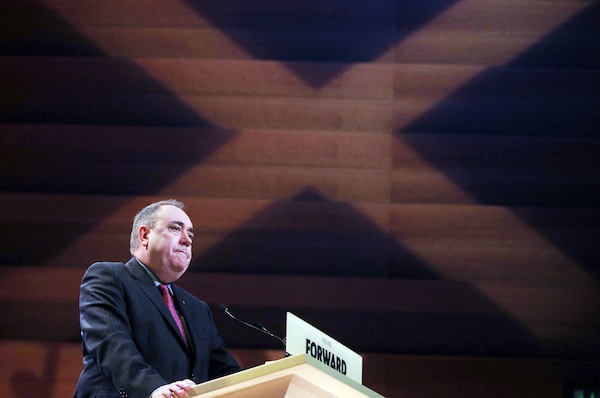For years Scotland has been waiting to see when his luck would run out – well, now it has. Alex Salmond: gambler, tipster, political animal and First Minister now has another moniker: author of the country’s first scomnishambles.
Yesterday marked, without doubt, the First Minister’s worst day in office. First, he lost two MSPs. Left-wingers Jean Urquhart and John Finnie announced they were leaving the SNP because of the party’s conversion to Nato. That decision, taken at SNP conference last weekend, has alienated many left-wingers in the party because they see it – rightly – as part of Salmond’s attempts to take the SNP into the moderate, centre ground of Scottish politics.
But the resignation of the two MSPs leaves Salmond, who came to power with a comfortable majority, holding on to power at Holyrood. His original majority of five was weakened with one of MSPs, Tricia Marwick, became Presiding Officer and another, Bill Walker, was suspended amid domestic abuse allegations. The resignation of Urquhart and Finnie leaves Salmond with a majority of just two over his opponents, a majority which could be wiped out in a single by-election.
But that wasn’t the worst of it yesterday.
No sooner had Salmond started to get to grips with the loss of his MSPs than his deputy, Nicola Sturgeon, announced that the Scottish Government had not asked for – nor been given – any legal advice on the position of an independent Scotland in the EU.
This may seem intricate, arcane and not particularly important but it is crucial, not just to Salmond’s standing but to the whole independence debate. He has been under pressure for months to reveal whether he has any legal advice on Scotland’s position in the EU after independence, and what that advice is – if there is any.
Salmond has refused to reveal anything, even though Scotland’s Information Commissioner has ordered him to and a court case was looming with Salmond fighting to keep everything secret.
The background is that the unionists believe an independent Scotland would have to re-apply for EU membership which would mean signing up to a host of obligations that the UK is exempt from including membership of the euro. The SNP has always insisted that Scotland would not have to re-apply, so would not have to join the euro – or anything else.
That was the position, stalemate, until yesterday’s surprise announcement from Sturgeon that the SNP didn’t actually have any legal advice to back up its position.
Not only that, but it then started dawning at Holyrood that Salmond was prepared to go to court and spending tens of thousands of pounds of taxpayers’ keeping absolutely nothing secret but his own lack of information. This was the same Salmond who appeared to argue on television earlier this year that he had, in fact, got legal advice to back up his arguments on the EU. At a stroke, Sturgeon’s statement blew open this whole part of the SNP’s case for independence. What had appeared to be a reasonably strong SNP argument, apparently backed up by legal opinion, immediately looked shady, shaky and insubstantial.
More than that, Salmond looked devious, conniving and prepared to waste taxpayers’ money to cover his own back. No wonder some MSPs started calling him a liar in public and then coined the term ‘scomnishambles’ to describe the SNP’s day.
Today David Cameron was given the chance in the Commons to pile further misery on Salmond’s head, an opportunity he duly availed himself of.
This is important, though, and not just as an excuse to watch the SNP in trouble. The case for an independent Scotland easing its way into the EU without joining the euro is at the centre of the SNP’s case for separation.
It is also important because, if this central pillar seems built on sand, then Scots will start asking about the foundations of the other SNP claims to independence. And, if that happens, the whole edifice might start to crumble.
Scomnishambles? It could be a whole lot more than that.






Comments